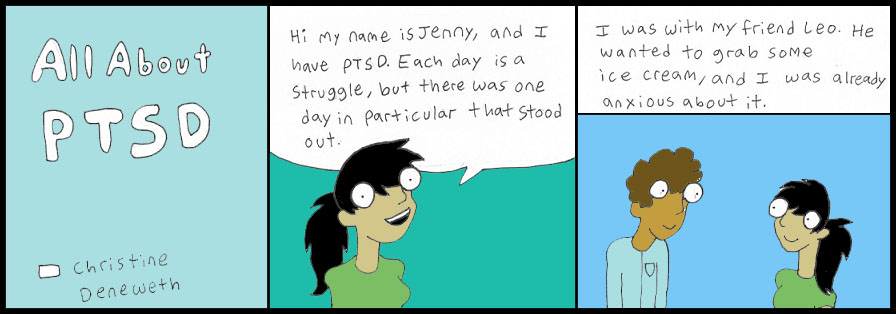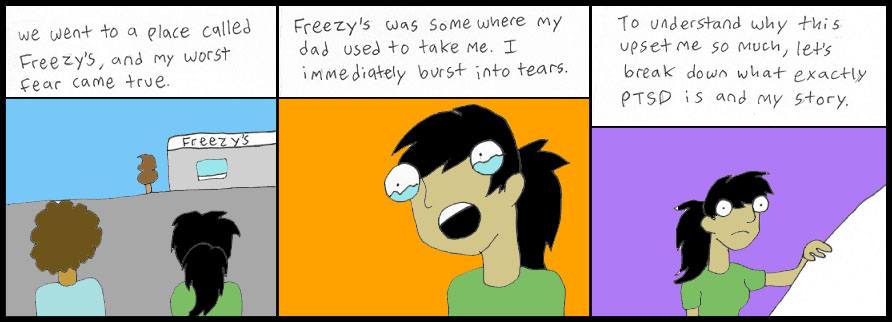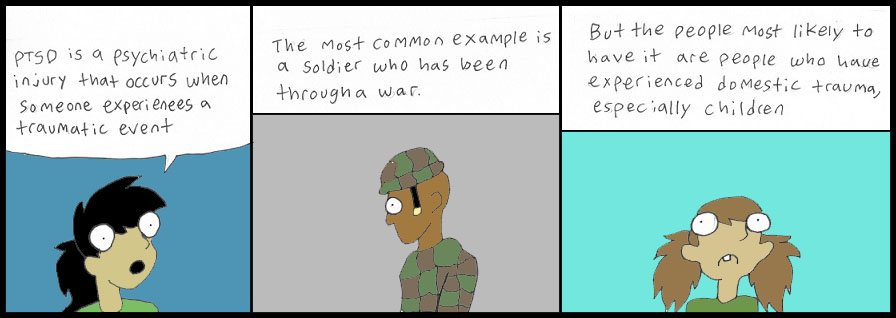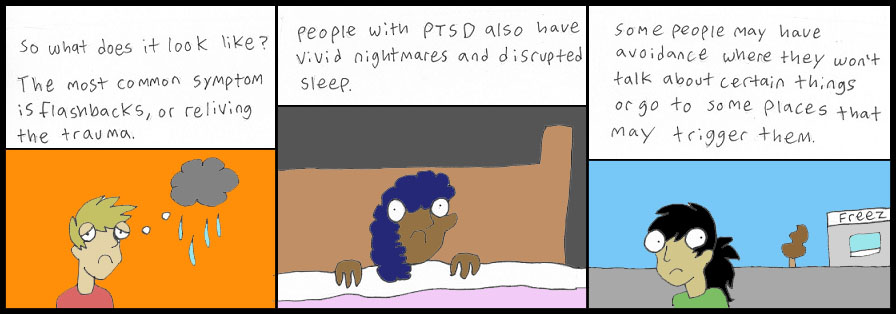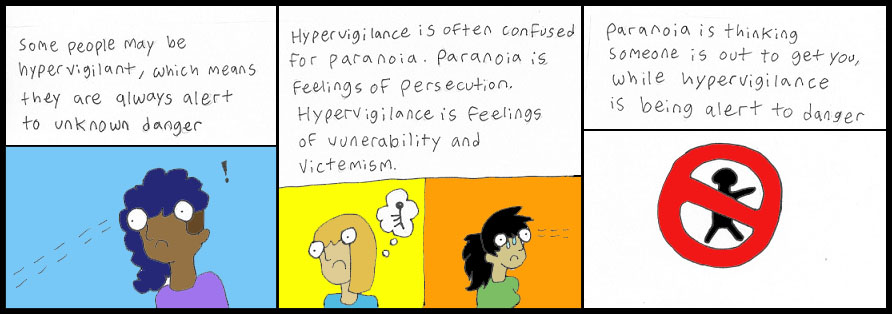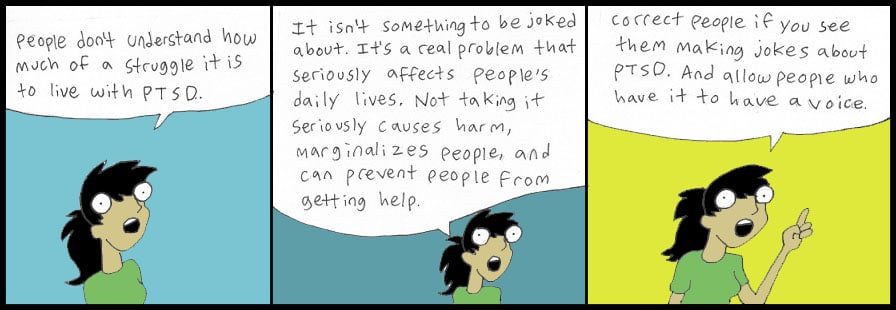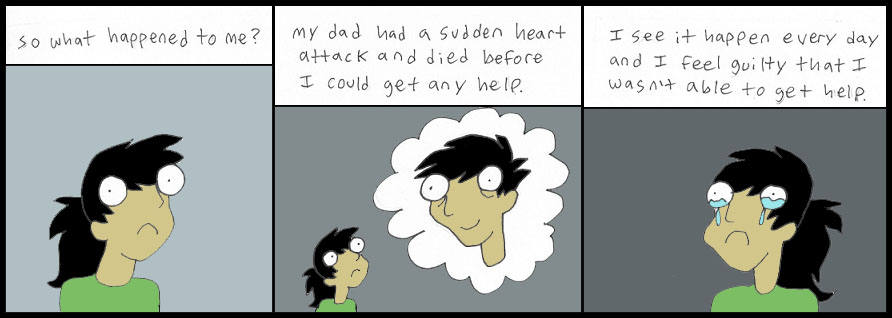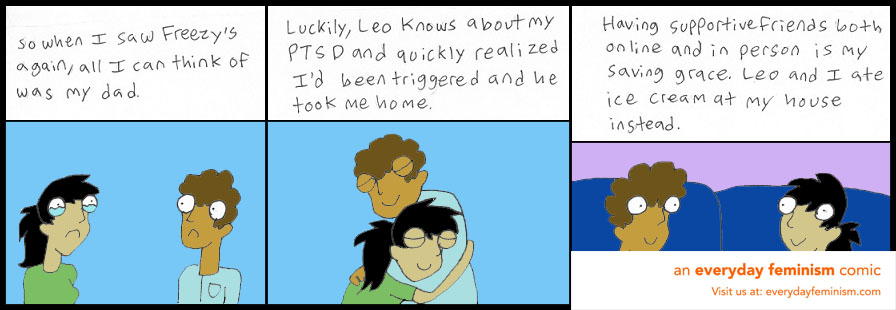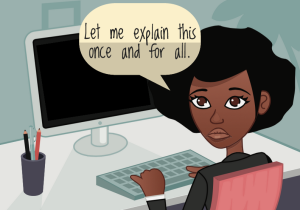Panel 1
Text: All about PTSD
Panel 2
Jenny talking and smiling. She has black hair and is wearing a green shirt.
Jenny: Hi, my name is Jenny, and I have PTSD. Each day is a struggle, but there was one day in particular that stood out.
Panel 3
Jenny smiling at her friend Leo. Leo has black curly hair and a blue long-sleeved shirt.
Text: I was with my friend Leo. He wanted to grab some ice cream, and I was already anxious about it.
Panel 4
Leo and Jenny standing in front of Freezy’s ice cream
Text: We went to a place called Freezy’s, and my worst fear came true.
Panel 5
Jenny, crying
Text: Freezy’s was somewhere my dad used to take me. I immediately burst into tears.
Panel 6
Jenny, turning the page
Text: To understand why this upset me so much, let’s break down what exactly PTSD is and my story.
Panel 7
Jenny, talking
Jenny: PTSD is a psychiatric injury that occurs when someone experiences a traumatic event.
Panel 8
Scared-looking soldier
Text: The most common example is a soldier who has been through a war.
Panel 9
Little girl, frowning
Text: But the people most likely to have it are people who have experienced domestic trauma, especially children.
Panel 10
Man, frowning, thinking about a storm cloud
Text: So what does it look like?
Text: The most common symptom is flashbacks, or reliving the trauma.
Panel 11
Woman, scared in bed
Text: People with PTSD also have vivid nightmares and disrupted sleep.
Panel 12
Jenny, walking past Freezy’s ice cream
Text: Some people may have avoidance where they won’t talk about certain things or go to some places that may trigger them.
Panel 13
Woman, scanning sorroundings
Text: Some people may be hypervigilant, which means they are always alert to unknown danger.
Panel 14
Jenny, talking and smiling. She has black hair and is wearing a green shirt.
Jenny: Hypervigilance is ofter confused for paranoia. Paranoia is feelings of persecution. Hypervigilance is feelings of vulnerability and victimisim.
Panel 15
Person in a “no” cross sign
Text: Paranoia is thinking someone is out to get you, while hypervigilance is being alert to danger.
Panel 16
Man, frowning
Text: Paranoia is usually a symptom of psychosis. But you absolutely can have psychosis and PTSD.
Panel 17
Man, startled by thinking of a storm cloud
Text: People who have psychosis and PTSD have flashbacks so vivid that they can believe they are real and happening.
Panel 18
Brain vs storm cloud
Text: But remember, psychosis has to do with brain chemistry, and PTSD has to do with external events.
Panel 19
Jenny, talking
Jenny: People don’t understand how much of a struggle it is to live with PTSD.
Panel 20
Jenny, talking
Jenny: It isn’t something to be joked about. It’s a real problem that seriously affects people’s daily lives. Not taking it seriously causes harm, marginalizes people, and can prevent people from getting help.
Panel 21
Jenny, talking and holding her hand up and pointing
Jenny: Correct people if you see them making jokes about PTSD. And allow people who have it to have a voice.
Panel 22
Jenny, frowning
Text: So what happened to me?
Panel 23
Image of Jenny’s dad and her frowning in the corner
Text: My dad had a sudden heart attack and died before I could get help.
Panel 24
Jenny, crying
Text: I see it happen every day, and I feel guilty that I wasn’t able to get help.
Panel 25
Jenny, crying, and Leo, looking concerned.
Text: So when I saw Freezy’s again, all I could think of was Dad.
Panel 26
Jenny and Leo, hugging
Text: Luckily Leo knows about my PTSD and quickly realized I’d been triggered, and he took me home.
Panel 27
Jenny and Leo, eating ice cream on the couch
Text: Having supportive friends both online and in person is my saving grace. Leo and I ate ice cream at home instead.
